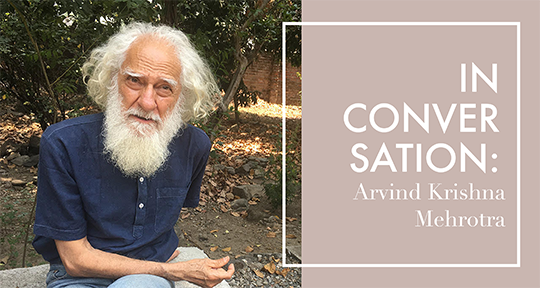As an essayist, literary historian, and critic, Arvind Krishna Mehrotra has been identified as one of the writers who wrestle with ‘what it means to connect the ideal of personal authenticity with wider forms of cultural identity’ by The Oxford History of Life-Writing (2022). As a poet, Modern Indian Poetry in English (2001) defines him as an experimentalist ‘who . . . has formed a poetic from local material, parody, and the conscious manipulation of chance’. In the late 60s, as a student at the University of Allahabad, Mehrotra started the avant-garde literary magazine damn you: a magazine of the arts, and later in Bombay, he founded ezra (1966-1969) and fakir (1966). In 1976, together with Adil Jussawalla, Arun Kolatkar, and Gieve Patel, he started Clearing House, a small press. Along with Eunice de Souza, they’ve come to be known as the Bombay Poets. Today, he is a renowned figure in contemporary Indian literature, with a voluminous bibliography spanning poetry, literary criticism, history, translation, and essays.
In this interview, I conversed with Mehrotra on The Book of Indian Essays: Two Hundred Years of English Prose (Permanent Black/Black Kite, 2020), an anthology he edited, its earliest essays appearing in periodicals that were, as Henry Derozio described them, ‘short-lived as bugs, and not so infrequent as angel-visits’; his translations of the fifteenth-century bhakti poet Kabir; and of love poems translated from the ancient Indo-Aryan language, Prākrit.
Alton Melvar M Dapanas (AMMD): Let’s talk about your selection process for The Book of Indian Essays: Two Hundred Years of English Prose (Black Kite, 2020). In an interview with Saikat Majumdar for Ashoka University, you commented that you had wanted to include V. S. Naipaul and Jhumpa Lahiri, but had to ‘narrow the field’.
Arvind Krishna Mehrotra (AKM): The suggestion to do an anthology of Indian essays came from Rukun Advani, the publisher of Permanent Black/Black Kite. We discussed a few names—perhaps also some essays to possibly include—but at the time nothing came of the idea. Then, in 2019, under a pile of brown paper envelopes, I came across one marked ‘Black Kite essays’. I’d recently finished reading the proofs of Translating the Indian Past and had been wondering what to do next. In that envelope was the answer: a bunch of photocopies, the beginnings of what became The Book of Indian Essays.
It was decided early on—more for practical reasons than parochial ones—to exclude writers who had spent most, if not all, of their lives outside India. The exceptions were Santha Rama Rau and Victor Anant, forgotten writers who I felt should be brought back into the conversation—not that any conversation was taking place. By leaving out Naipaul, Lahiri, and a few others, I was also able to bring in people like Gautam Bhatia, who is an architect, and the historian Sanjay Subrahmanyam.
Since the essay is more pliable than poetry or fiction, it has been wielded with considerable style and effect by writers who might be widely known for their work in their professional fields—as Bhatia and Subrahmanyam are—but are less visible as essayists in English. I’ve always been slightly more interested in the less visible than I am in those who are always in the limelight. The latter can look after themselves and are doing it very well. There will, however, come a time when present limelight will fade into the harsh glow of oblivion, and they too will be forgotten—which is why we need literary histories and anthologies. READ MORE…



